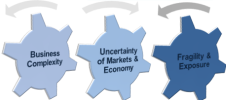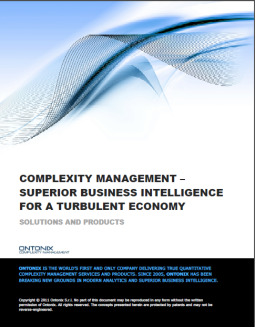"Complexity itself has become the problem": Consultant-News.com
Monday, 5 September, 2011 2 Comments
If we are to (re)build financial resilience then it can only be done with a greater understanding of what makes a system fragile. So, I am delighted that more and more Consultancies are promoting the “complexity message”.
Although, as I have journeyed deeper into the subject, it has become clear that most of what is written about complexity theory is dense, academic and/or expensive. On the other hand, I often read or listen to consultants, ‘experts’ and media people who proffer ludicrously simplistic ‘solutions’ to complex predicaments, often without the ability to offer a clear, concise or measurable definition of complexity…not the best starting point IF considering engaging a Consultant!!!
Since it seems most people would prefer things to be simple, these ‘experts’ always seem to have an uncritical audience. I can’t comment upon the competence of any of these firms but, I CAN say that the Ontonix approach offers a radically different and transparent solution*.Our technology is NOT borne of a qualitative process but is rooted in science and mathematics.
This is certainly reassuring for our customers! Particularly those involved in healthcare, automotive, aerospace, air traffic control where lives are at risk or in environments such as multi-million manufacturing plants, banking, IT or telecommunications where economic survival are of particular concern.
* The need for transparency is paramount: otherwise one, unwittingly, (re)commences the process of creating complexity! It doesn’t get more transparent than the offer of a FREE and confidential, on-line, analysis of the financial data generated by a business. A range of templates and tools are available to download from our website. There are step-by-step instructions but the process is straightforward and fast. Click on the embedded link:
It’s not easy to detect paradigm shifts—as a columnist, it’s best to claim to detect as many as possible and quietly bury your failures—but I would definitely say I’m hearing a definite rumble around the notion of complexity. It’s one of those pattern/background shifts—more and more people seem to be coming to a realisation that it’s not so much that their problems are complex, but that their problem is complexity.
In fact, according to Stephen Wilson of consultants Wilson Perumal, 80 per cent of CEOs now say that complexity has outstripped their ability to manage it. But the very factors that have driven complexity—such as increased organisational size and diversity—have undermined people’s ability to deal with it.
“You get a lot of smart people making good decision independently without thinking about how the whole thing fits together,” he says. “So, for example, you get a bias towards product proliferation, because the benefits are local, while the costs are distributed.”
via Consultant-News.com – Latest News from the World of Consultancy.
Related articles
- What price simplicity? (fitforrandomness.wordpress.com)
- Ontonix – Complexity Management & Business Risk Management (fitforrandomness.wordpress.com)
- IBM: Improving collaboration, tackling complexity The Invisible Thread (fitforrandomness.wordpress.com)
- What every leader needs to know…but can be too afraid to ask! (fitforrandomness.wordpress.com)
- Improve Profitability & Reduce Risk – Thrive in a Recession – Forbes (fitforrandomness.wordpress.com)













David, the interesting thing about ‘complexity’ is that in essence it does not really exist, it is a virtual perception, subjectively created by some viewers but not by others. I often hear people commenting how ‘in the past the world used to be simpler’. If you contrast the changing reality in the world over the past 500 years or so it is not difficult to see that what some call ‘increased complexity’ is really increased level of interaction, increased lines of communication, many more interfaces etc. So it is not that the world has become more complex, it is us who have changed as we now want to manage far more interactions than our evolutionary capability is allowing us to do comfortably. And this is where Darwin’s theory kicks in. Those of us who feel more comfortable in managing the increased load will do better than those for whom this increased load is a point of increased pressure and tension.
Apologies Shim it is remiss of me not to respond earlier. Thanks again for your comment.
If teams of Academics across the globe can investigate the subject matter for as long as they have without agreeing a common language let alone a definition for “complexity” then it is extremely unlikely that we are going to crack that in the course of an exchange of comments! I am not sure how I can answer you, so I will pose this question:
how can one measure something that is a “virtual perception” and use that measure to, successfully, manage the observed system away from a (measurable threshold) critical point, at which the physical evidence and cost of a loss of functionality, breakdown or collapse is measurable?
Our insatiable demand for more, better, smaller, faster, etc. has certainly ensured that we have become reliant upon, multiple interactions. We NEED to manage what we have created but the nature of (complex) systems is such that our creativity outstripped our ability to, objectively, observe multiple, sometimes simultaneous, interactions at micro even nano scale so we have been unable to track causality. Observing inputs, outputs and outcomes at macro scale can lead to wrong assumptions, conclusions and actions. There is very little scope or appetite to “unlearn”.
But I think we need only go back as far as the Industrial Revolution to see the extent to which things have changed, how and why: for a very long time we have applied a linear perspective on a non-linear world and now we must learn from what nature tells us about “systems”. Cells, organs, individuals, families, communities, species, environments, processes, technologies, business units, teams, Divisions, Companies, institutions, economies, etc. that operate around the (unseen not unforeseeable) bounds of a manageable “load” are fragile, as minor changes within the environment within which they exist can lead to their collapse. Who wants to, knowingly, interact with a system that is: unstable; unpredictable; difficult to manage?
Darwin was right, at least insofar as fitness and adaptability being key to survival is concerned, but even he may not have realised the variety of environments and scales at which his famous quote was applicable.